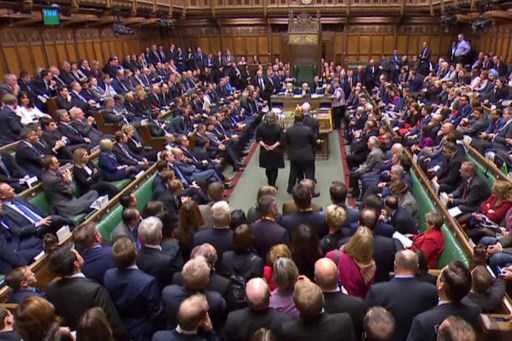
by Alice Ritchie
Agence France-Presse
LONDON, United Kingdom (AFP) — British Prime Minister Theresa May on Wednesday suffered a damaging parliamentary defeat on the eve of a crucial EU summit, after her own MPs rebelled to demand parliament have the final say on a Brexit divorce deal.
Eleven members of May’s Conservative party joined with opposition lawmakers to inflict the government’s first defeat over the flagship EU (Withdrawal) Bill, sparking huge cheers in the House of Commons.
Ministers had sought to buy off its critics with a last-minute concession, but leading rebel Dominic Grieve, a former attorney general, had warned: “It’s too late.”
His amendment would require new legislation to implement any divorce deal with Brussels before Britain leaves the EU in March 2019.
It passed by 309 votes to 305, with a twelfth Conservative MP effectively abstaining by voting in both camps.
The defeat was a blow to May the day before EU leaders gather in Brussels to approve the terms of an interim Brexit deal struck last week after months of negotiation.
That deal was a rare moment of triumph for the prime minister, who has endured a turbulent few months since losing her parliamentary majority in disastrous snap elections in June.
Opposition Labour leader Jeremy Corbyn said the vote represented a “humiliating loss of authority” for May.
The government said it was “disappointed,” adding: “We will now determine whether further changes are needed to the bill to ensure it fulfils its vital purpose.”
Hampering ‘smooth’ Brexit
The EU (Withdrawal) Bill is intended to formally end Britain’s membership of the bloc as well as smooth its exit by transferring thousands of pieces of European legislation onto the UK statute books.
It also gives ministers powers to amend the laws as they move across without full parliamentary scrutiny, to address any technical glitches.
But MPs objected to the fact that these so-called “Henry VIII” powers also extend to the implementation of the final deal on the terms of Brexit and a transition.
Tory MP Iain Duncan Smith, a hardline Brexiteer, had accused Grieve of “looking for ways to derail the bill,” saying his amendment would “tie the government’s hands” in negotiations with the EU.
But one Conservative MP, Antoinette Sandbach, had warned: “The government is presiding over a monumental task of immense importance for the future of this country.
“With any such change it is imperative that parliament maintains close scrutiny and oversight of the process.”
Hours before the vote, Brexit Secretary David Davis promised MPs that no withdrawal agreement would be implemented until a vote in parliament.
Parliament would then be asked to approve a further piece of legislation to implement the deal.
But ministers insisted they needed to retain their special powers in the event that this law was not passed in time.
“That could be at a very late stage in the proceedings, which could mean that we are not able to have the orderly and smooth exit from the European Union that we wish to have,” May told MPs earlier.
Gina Miller, a campaigner who successfully fought last year for an increased role for MPs in the Brexit process, said after the vote: “Parliamentary sovereignty wins the day!”
‘Blank cheque’
After months of wrangling, May secured a deal last week on three priorities of the separation — Britain’s financial settlement, the Irish border and the rights of expatriates.
The European Parliament on Wednesday gave its backing to the deal which, if approved at the summit later this week, should now allow the negotiations to move onto trade.
But the Commons vote spells further domestic trouble ahead for May, as parliament and her Conservative party are divided about Britain’s future relationship with the EU.
Grieve had warned that ministers were asking for “a blank cheque to the government to achieve something that, at the moment, we don’t know what it is.”
The government responded swiftly to sack one of the rebels, Stephen Hammond, from his role as the Conservative party’s vice chairman.
Nigel Farage, a long-time member of the European Parliament and a key driving force behind the Brexit campaign, said: “My contempt for career politicians knows no bounds.”
© Agence France-Presse







